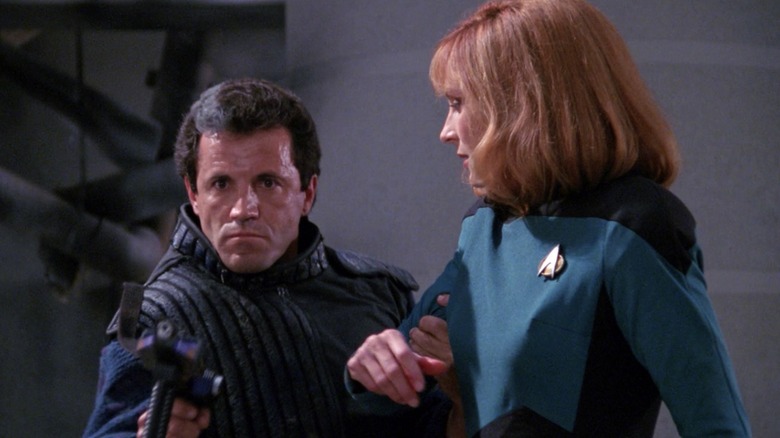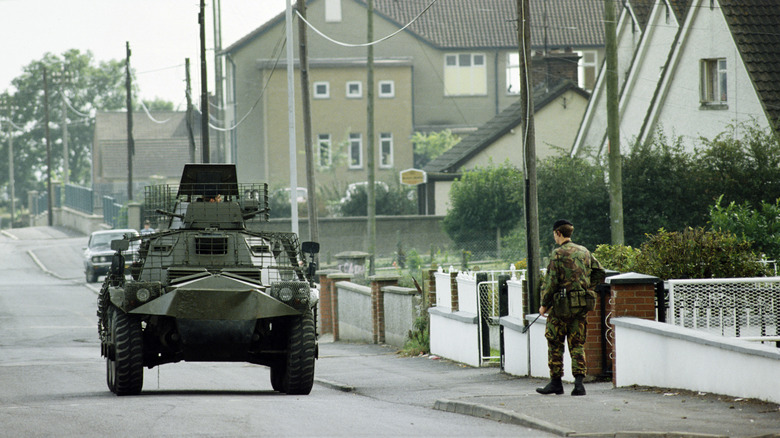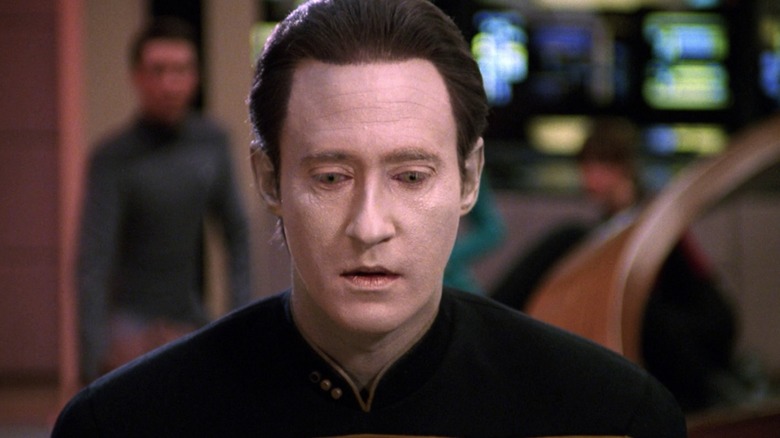Why A Star Trek Episode Was Prohibited From Airing In Ireland
With the inaugural series' diverse bridge crew and a story built around a post-scarcity society based on semi-utopian ideals, the "Star Trek" universe has always had political dialogue and social commentary infused in its DNA. Like they do in a lot of great sci-fi, the writers' efforts tend to land best when they're written allegorically. But every once in a while, the politics of "Star Trek" hit a little too close to home for some audiences. That's what happened when a seemingly throwaway line in an episode of "The Next Generation" created unintended controversy that led to the episode's ban on Irish television.
First premiering in January 1990 in the United States, "The High Ground" finds the Enterprise caught up in a non-Federation planet's power struggle when insurgents take Dr. Crusher (Gates McFadden) hostage. While weighing their options, Data (Brent Spiner) contemplates the efficacy of terrorist methods, citing several examples including the "Irish Unification of 2024."
The episode aired during a decades-long period of sectarian violence in Northern Ireland. Known commonly as the Troubles, this conflict between loyalists to the British crown and Irish nationalists marked a period of heightened violence, riots, and guerilla warfare in which thousands of people were killed. Due to the understandable sensitivity surrounding this conflict and its sociopolitical issues, the episode has been subjected to varying degrees of censorship and at times, an outright ban in the region.
The ban followed conflict in Northern Ireland
"Star Trek: The Next Generation" was originally released in syndication, and this sometimes meant episodes might not air overseas for years after their U.S. release. When it finally aired on the British broadcaster Sky, the crucial exchange between Data and Captain Picard (Patrick Stewart) was omitted. The episode would not air on the BBC until 2007, never airing again after that point. And according to the network's records, "The High Ground" was never played on the Irish network RTÉ. Understanding the specifics of how each ban went down is difficult, though there is plenty available to speculate on.
During the early 1990s, the low-level but ever-present threat of violence underlined life in Northern Ireland. The paramilitary Provisional Irish Republican Army, which favored unification, aimed to see Northern Ireland gain its independence from the United Kingdom and unite with the sovereign republic of Ireland. The 1992 IRA attack on London's Baltic Exchange, which killed three people and injured dozens, had U.K. leaders on edge, ultimately leading to strict censorship against Northern Irish groups deemed to be supporting Irish nationalists.
In "The High Ground," Data cites the Irish Unification as an example of a time when terrorism served as an "effective way to promote political change." For real-world leaders in Ireland and the United Kingdom, suggesting that continued violence could lead to the IRA's success may have come too close to implying support for the cause.
The discourse the episode explored continues today
By the time she penned "The High Ground," writer Melinda Snodgrass had already proven her skill with a script. She had already written four episodes of "Star Trek: The Next Generation," including the fan-favorite "The Measure of a Man." With "The High Ground," Snodgrass had intended to draw parallels to the Troubles. "I was a history major before I went to law school and I wanted to get into that; discuss the fact that one man's freedom fighter is another man's terrorist," she explained to the BBC.
Snodgrass was particularly concerned with the notion that anyone would feel so desperate that they would consider escalation to violence and under what — if any — circumstances that violence could be justifiable. She concluded, "I think what I wanted to say was: if we're talking and not shooting, we're in a better place."
The controversy surrounding Data's line in "The High Ground" had come as a surprise, according to Snodgrass. "We became aware of it later ... and there isn't much you can do about it," she said. But times change, and for now, dialogue over the possibility of Irish unification seems to have replaced the violence that once was. Both sides reached a ceasefire in 1994, and over the past few decades, the IRA's political arm, Sinn Féin, has emerged as the Northern Ireland Assembly's largest political party. In 2024, Northern Ireland elected Sinn Féin candidate Michelle O'Neill as its First Minister. With their rise to power, calls for a referendum on the issue of Irish unification continue to gain speed in both the Republic of Ireland and Northern Ireland.
Given those real-world developments, it's safe to say that "The High Ground" isn't one of those "Star Trek" episodes that aged poorly.


